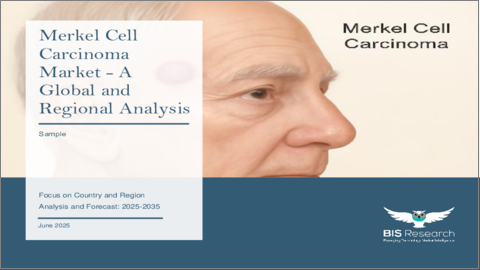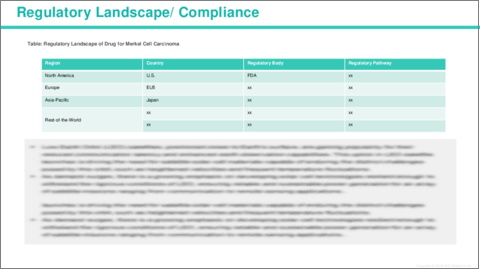|
|
市場調査レポート
商品コード
1759269
メルケル細胞癌の世界市場:地域・国別の分析・予測 (2025-2035年)Merkel Cell Carcinoma Market - A Global and Regional Analysis: Focus on Country and Region - Analysis and Forecast, 2025-2035 |
||||||
カスタマイズ可能
|
|||||||
| メルケル細胞癌の世界市場:地域・国別の分析・予測 (2025-2035年) |
|
出版日: 2025年06月30日
発行: BIS Research
ページ情報: 英文 100 Pages
納期: 1~5営業日
|
全表示
- 概要
- 図表
- 目次
メルケル細胞癌 (MCC) 市場の主な成長要因の一つは、免疫療法の進歩です。
Keytruda (ペムブロリズマブ) やOpdivo (ニボルマブ) といった免疫チェックポイント阻害剤の承認および使用の拡大により、進行性・転移性メルケル細胞癌の治療は劇的に変化し、患者の生存率が大幅に改善されました。これらの治療法は、体内の免疫システムを活性化させて癌細胞を認識・攻撃させる仕組みで、従来の化学療法と比較してより標的を絞った効果的なアプローチを提供します。免疫療法による治療の成功は、メルケル細胞癌に対する新たな治療法の開発に大きな関心と投資を呼び込み、市場の成長をさらに促進しています。さらに、メルケル細胞癌に関する認知度の向上と診断技術の進歩により、より多くの患者が早期に診断されるようになり、効果的な治療法に対する需要も増加しています。こうした技術革新、診断の進展、免疫療法の役割の拡大が組み合わさることで、メルケル細胞癌市場の拡大を強く後押ししています。
しかし、メルケル細胞癌 (MCC) 市場の成長にはいくつかの課題も存在します。最大の課題の一つが、KeytrudaやOpdivoといった免疫療法薬の治療コストの高さです。これらの治療は非常に効果的である一方、非常に高価であるため、低所得地域や十分な保険がない患者にとっては治療へのアクセスが制限される恐れがあります。
このような費用の障壁は、患者が命を救う治療を受ける機会を奪うだけでなく、医療制度や保険会社にとっても大きな財政的負担となります。また、メルケル細胞癌は稀な疾患であるため、製薬企業がこの疾患に特化した治療薬の開発や販売にかかる高コストを正当化するのが難しく、代替治療法の選択肢が限られてしまうという問題もあります。したがって、これらの先進的な治療法への公平なアクセスを確保することが、今後のメルケル細胞癌市場の持続的成長にとって重要な課題となっています。
世界のメルケル細胞癌 (MCC) 市場は競争が激しく、主要企業数社が革新と市場成長を牽引しています。Merck & Co.はKeytruda (ペムブロリズマブ) で、免疫療法を通じて優れた生存率を実現し、メルケル細胞癌治療において支配的な地位を築いています。Bristol Myers SquibbもOpdivo (ニボルマブ) で、進行性メルケル細胞癌の治療に成功し、主要な企業として存在感を示しています。Incyte Corporationは、Jakafi (ルキソリチニブ) のメルケル細胞癌への応用を模索しており、癌領域での治療応用拡大を目指しています。Amgenも最先端の免疫療法や標的治療の開発に取り組んでいます。これらの企業は、治療法の革新だけでなく、併用療法や個別化医療、早期診断技術にも注力しており、メルケル細胞癌治療の可能性を広げています。主要企業が継続的に革新を進めることで、患者の予後が改善され、メルケル細胞癌市場の成長がさらに加速するでしょう。
当レポートでは、世界のメルケル細胞癌の市場を調査し、主要動向、市場影響因子の分析、法規制環境、臨床試験の動向、市場規模の推移・予測、各種区分・地域/主要国別の詳細分析、競合情勢、主要企業のプロファイルなどをまとめています。
目次
エグゼクティブサマリー
第1章 世界のメルケル細胞癌市場:業界展望
- 市場動向
- 規制の枠組み
- 疫学分析
- 臨床試験分析
- 市場力学
- 影響分析
- 市場促進要因
- 市場の課題
- 市場機会
第2章 世界のメルケル細胞癌市場:地域別
- 北米
- 主な調査結果
- 市場力学
- 市場規模と予測
- 欧州
- 主な調査結果
- 市場力学
- 市場規模と予測
- アジア太平洋
- 主な調査結果
- 市場力学
- 市場規模と予測
第3章 世界のメルケル細胞癌市場:競合情勢と企業プロファイル
- 主な戦略・展開
- M&A
- 相乗効果のある活動
- 事業拡大と資金調達
- 製品の発売と承認
- その他の活動
- 企業プロファイル
- Merck KGaA
- Merck & Co.
- Incyte Corporation
- MacroGenics, Inc.
- Philogen S.p.A.
- Immunomic Therapeutics, Inc.
- Kymera Therapeutics, Inc.
- Merus N.V.
- AgonOx, Inc.
- Bristol Myers Squibb
第4章 調査手法
List of Figures
- Figure: Global Merkel Cell Carcinoma Market (by Region), $Billion, 2024 and 2035
- Figure: Global Merkel Cell Carcinoma Market Key Trends, Analysis
List of Tables
- Table: Global Merkel Cell Carcinoma Market Dynamics, Impact Analysis
- Table: Global Merkel Cell Carcinoma Market (by Region), $Billion, 2024-2035
Global Merkel Cell Carcinoma Market, Analysis and Forecast: 2025-2035
Merkel Cell Carcinoma (MCC) is a rare and aggressive type of skin cancer that originates in the Merkel cells, which are found in the outermost layer of the skin (the epidermis). These cells are responsible for sensing touch and are located near the base of the epidermis, typically in areas of the skin that are exposed to the sun. merkel cell carcinoma is characterized by its rapid growth and potential to spread quickly (metastasize) to other parts of the body, making it a highly dangerous and life-threatening cancer when diagnosed at advanced stages.
The disease is most commonly seen in older adults, particularly those over the age of 70, and it is more prevalent in people with weakened immune systems or those who have extensive sun exposure. In most cases, merkel cell carcinoma is associated with the Merkel Cell Polyomavirus (MCPyV), a virus that is present in the majority of cases. Treatment options for merkel cell carcinoma include surgery, radiation therapy, chemotherapy, and immunotherapy, with the latter, particularly immune checkpoint inhibitors like Keytruda (pembrolizumab) and Opdivo (nivolumab), becoming increasingly important in managing advanced or metastatic forms of the disease.
One of the key drivers of the merkel cell carcinoma (MCC) market is the advancement of immunotherapy. The approval and increasing use of immune checkpoint inhibitors like Keytruda (pembrolizumab) and Opdivo (nivolumab) have revolutionized the treatment of advanced and metastatic merkel cell carcinoma, significantly improving patient survival rates. These therapies work by enhancing the body's immune system to recognize and attack cancer cells, offering a more targeted and effective approach compared to traditional treatments like chemotherapy. The success of immunotherapy in treating merkel cell carcinoma has generated significant interest and investment in the development of new therapies, further driving merkel cell carcinoma market growth. Additionally, as awareness of merkel cell carcinoma increases and diagnostic techniques improve, more patients are being diagnosed early, increasing the demand for effective treatment options. This combination of technological advancements, better diagnosis, and the growing role of immunotherapy is a major driver in the expansion of the merkel cell carcinoma market.
Despite the growth of the Merkel Cell Carcinoma (MCC) market, several challenges continue to hinder its progress. One of the primary challenges is the high cost of treatment, particularly with the use of immunotherapy drugs such as Keytruda (pembrolizumab) and Opdivo (nivolumab). These therapies, while highly effective, can be prohibitively expensive, limiting access to care for some patients, especially in lower-income regions or among those without adequate insurance coverage.
This cost barrier not only affects patient access to life-saving treatments but also places significant pressure on healthcare systems and insurance providers. Additionally, the rarity of merkel cell carcinoma makes it more difficult for pharmaceutical companies to justify the high costs associated with developing and marketing drugs specifically for this cancer, which further limits the availability of alternative treatment options. As a result, ensuring equitable access to these advanced therapies remains a critical challenge in the continued growth of the merkel cell carcinoma market.
The global Merkel Cell Carcinoma (MCC) market is highly competitive, with several leading companies driving innovation and market growth. Merck & Co., with its Keytruda (pembrolizumab), has become a dominant force in the merkel cell carcinoma treatment landscape, offering advanced survival outcomes through immunotherapy. Bristol Myers Squibb, with its Opdivo (nivolumab), is another major player, contributing to the merkel cell carcinoma market with successful immune checkpoint inhibitors for treating advanced merkel cell carcinoma. Incyte Corporation is exploring the potential of Jakafi (ruxolitinib) for merkel cell carcinoma, aiming to expand its therapeutic applications in oncology. Amgen is also in the race, developing cutting-edge immunotherapies and targeted treatments. These companies are not only advancing therapies but are also focusing on combination treatments, personalized medicine, and early detection technologies, pushing the boundaries of what is possible in treating merkel cell carcinoma. As these key players continue to innovate, they will significantly shape the future of merkel cell carcinoma treatment, enhancing patient outcomes and driving merkel cell carcinoma market growth.
Merkel Cell Carcinoma Market Segmentation:
Segmentation 1: by Region
- North America
- Europe
- Asia-Pacific
The global Merkel Cell Carcinoma (MCC) market is undergoing significant transformation, fueled by emerging trends that are reshaping the landscape of diagnosis and treatment. One of the key drivers is the rise of immunotherapy, particularly immune checkpoint inhibitors like Keytruda (pembrolizumab) and Opdivo (nivolumab), which have become the standard of care for advanced merkel cell carcinoma. These therapies are enhancing survival rates and improving patient quality of life. Alongside immunotherapy, combination therapies, which integrate immune treatments with chemotherapy or radiation, are gaining traction and showing promising results in improving outcomes for advanced cases.
The focus on precision medicine and targeted therapies is also growing, with researchers exploring treatments that target specific molecular drivers of merkel cell carcinoma, such as the Merkel Cell Polyomavirus (MCPyV). Additionally, the increasing awareness of skin cancers and the advancement of early detection methods are leading to more diagnoses at earlier stages, ultimately boosting market demand for treatment options.
As access to care improves globally, particularly in emerging markets, and regulatory bodies expedite approvals for innovative therapies, the merkel cell carcinoma market is poised for continued growth, offering new opportunities and challenges for healthcare providers and pharmaceutical companies.
Table of Contents
Executive Summary
Scope and Definition
Market/Product Definition
Inclusion and Exclusion
Key Questions Answered
Analysis and Forecast Note
1. Global Merkel Cell Carcinoma Market: Industry Outlook
- 1.1 Introduction
- 1.2 Market Trends
- 1.3 Regulatory Framework
- 1.4 Epidemiology Analysis
- 1.5 Clinical Trial Analysis
- 1.6 Market Dynamics
- 1.6.1 Impact Analysis
- 1.6.2 Market Drivers
- 1.6.3 Market Challenges
- 1.6.4 Market Opportunities
2. Global Merkel Cell Carcinoma Market (Region), ($Billion), 2023-2035
- 2.1 North America
- 2.1.1 Key Findings
- 2.1.2 Market Dynamics
- 2.1.3 Market Sizing and Forecast
- 2.1.3.1 North America Merkel Cell Carcinoma Market, by Country
- 2.1.3.1.1 U.S.
- 2.1.3.1 North America Merkel Cell Carcinoma Market, by Country
- 2.2 Europe
- 2.2.1 Key Findings
- 2.2.2 Market Dynamics
- 2.2.3 Market Sizing and Forecast
- 2.2.3.1 Europe Merkel Cell Carcinoma Market, by Country
- 2.2.3.1.1 Germany
- 2.2.3.1.2 U.K.
- 2.2.3.1.3 France
- 2.2.3.1.4 Italy
- 2.2.3.1 Europe Merkel Cell Carcinoma Market, by Country
- 2.3 Asia Pacific
- 2.3.1 Key Findings
- 2.3.2 Market Dynamics
- 2.3.3 Market Sizing and Forecast
- 2.3.3.1 Asia Pacific Merkel Cell Carcinoma Market, by Country
- 2.3.3.1.1 China
- 2.3.3.1.2 Japan
- 2.3.3.1 Asia Pacific Merkel Cell Carcinoma Market, by Country
3. Global Merkel Cell Carcinoma Market: Competitive Landscape and Company Profiles
- 3.1 Key Strategies and Development
- 3.1.1 Mergers and Acquisitions
- 3.1.2 Synergistic Activities
- 3.1.3 Business Expansions and Funding
- 3.1.4 Product Launches and Approvals
- 3.1.5 Other Activities
- 3.2 Company Profiles
- 3.2.1 Merck KGaA
- 3.2.1.1 Overview
- 3.2.1.2 Top Products / Product Portfolio
- 3.2.1.3 Top Competitors
- 3.2.1.4 Target Customers/End-Users
- 3.2.1.5 Key Personnel
- 3.2.1.6 Analyst View
- 3.2.2 Merck & Co.
- 3.2.2.1 Overview
- 3.2.2.2 Top Products / Product Portfolio
- 3.2.2.3 Top Competitors
- 3.2.2.4 Target Customers/End-Users
- 3.2.2.5 Key Personnel
- 3.2.2.6 Analyst View
- 3.2.3 Incyte Corporation
- 3.2.3.1 Overview
- 3.2.3.2 Top Products / Product Portfolio
- 3.2.3.3 Top Competitors
- 3.2.3.4 Target Customers/End-Users
- 3.2.3.5 Key Personnel
- 3.2.3.6 Analyst View
- 3.2.4 MacroGenics, Inc.
- 3.2.4.1 Overview
- 3.2.4.2 Top Products / Product Portfolio
- 3.2.4.3 Top Competitors
- 3.2.4.4 Target Customers/End-Users
- 3.2.4.5 Key Personnel
- 3.2.4.6 Analyst View
- 3.2.5 Philogen S.p.A.
- 3.2.5.1 Overview
- 3.2.5.2 Top Products / Product Portfolio
- 3.2.5.3 Top Competitors
- 3.2.5.4 Target Customers/End-Users
- 3.2.5.5 Key Personnel
- 3.2.5.6 Analyst View
- 3.2.6 Immunomic Therapeutics, Inc.
- 3.2.6.1 Overview
- 3.2.6.2 Top Products / Product Portfolio
- 3.2.6.3 Top Competitors
- 3.2.6.4 Target Customers/End-Users
- 3.2.6.5 Key Personnel
- 3.2.7 Kymera Therapeutics, Inc.
- 3.2.7.1 Overview
- 3.2.7.2 Top Products / Product Portfolio
- 3.2.7.3 Top Competitors
- 3.2.7.4 Target Customers/End-Users
- 3.2.7.5 Key Personnel
- 3.2.7.6 Analyst View
- 3.2.8 Merus N.V.
- 3.2.8.1 Overview
- 3.2.8.2 Top Products / Product Portfolio
- 3.2.8.3 Top Competitors
- 3.2.8.4 Target Customers/End-Users
- 3.2.8.5 Key Personnel
- 3.2.8.6 Analyst View
- 3.2.9 AgonOx, Inc.
- 3.2.9.1 Overview
- 3.2.9.2 Top Products / Product Portfolio
- 3.2.9.3 Top Competitors
- 3.2.9.4 Target Customers/End-Users
- 3.2.9.5 Key Personnel
- 3.2.10 Bristol Myers Squibb
- 3.2.10.1 Overview
- 3.2.10.2 Top Products / Product Portfolio
- 3.2.10.3 Top Competitors
- 3.2.10.4 Target Customers/End-Users
- 3.2.10.5 Key Personnel
- 3.2.10.6 Analyst View
- 3.2.10.7 Analyst View
- 3.2.1 Merck KGaA






